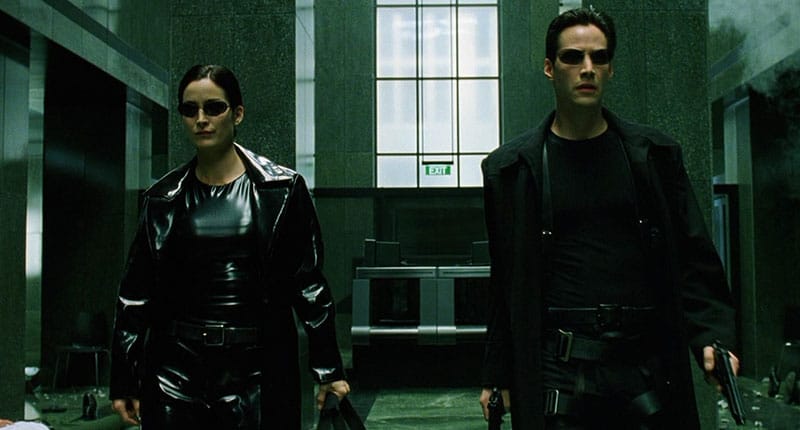The Plot of The Matrix
The Matrix takes place in a dystopian future where humanity is enslaved by sentient machines that have taken over the world. The humans are kept sedated in a computer-generated simulation of the late 20th century called the Matrix, while their bodies are used as an energy source for the machines. The story follows Neo, a hacker who is contacted by a group of rebels who are fighting against the machines. They believe that Neo is the prophesied “One” who will be able to defeat the machines and free humanity from the Matrix.Themes in The Matrix
Reality vs. Illusion
One of the central themes of The Matrix is the idea of reality vs. illusion. The Matrix itself is a computer-generated simulation that is designed to keep humans trapped in a false reality. Neo’s journey in the movie is about discovering the truth about the world and his place in it. The movie asks the question, what is real? Is the world we experience just an illusion, and is there a deeper reality underneath it all?Free Will vs. Determinism
Another important theme in The Matrix is the idea of free will vs. determinism. The machines in the movie have created a world where humans have no free will. They are controlled by the machines and are kept in a state of ignorance. Neo’s journey in the movie is about discovering his own free will and his ability to make choices that can change the world. The movie raises the question, are we truly in control of our lives, or are our choices predetermined by outside forces?Identity and Self-Discovery
A third theme in The Matrix is the idea of identity and self-discovery. Neo begins the movie as a hacker who feels out of place in the world. He is searching for something more, and his journey in the movie is about discovering his true identity. The Matrix asks the question, who are we, and what is our purpose in life? Are we defined by our past, or can we create our own destiny?Recommended :: The Batman: Origin, Powers, and Abilities Explained
The Impact of The Matrix
The Matrix and Popular Culture
The Matrix had a significant impact on popular culture when it was released in 1999. The movie’s iconic action sequences, its use of special effects, and its themes resonated with audiences around the world. The movie spawned a franchise that includes sequels, video games, and comic books. The Matrix has been referenced in countless movies, TV shows, and other forms of media, and its impact can still be felt in popular culture today.The Matrix and Philosophy
The Matrix also had a significant impact on philosophy and academic discourse. The movie’s themes of reality vs. illusion, free will vs. determinism and identity and self-discovery have been the subject of numerous philosophical discussions and debates. The Matrix has been studied in philosophy courses, and its ideas have been used to explore topics such as metaphysics, epistemology, and ethics. The movie has been praised for its ability to make philosophical concepts accessible to a wider audience, and it has been credited with sparking an interest in philosophy among younger generations.Exploring the Popularity of Zombie Films
The Legacy of The Matrix
The Matrix Sequels
The Matrix franchise includes two sequels, The Matrix Reloaded and The Matrix Revolutions, which were released in 2003. The sequels expanded on the mythology of the original movie, introducing new characters and exploring new themes. However, the sequels were not as well-received as the original movie and were criticized for being overly complex and convoluted.The Matrix in the 21st Century
Despite the mixed reception of the sequels, The Matrix continues to be a cultural touchstone in the 21st century. The movie’s themes of reality vs. illusion, free will vs. determinism, and identity and self-discovery remain relevant today, and the movie’s impact on popular culture and philosophy can still be felt. The Matrix has influenced numerous movies and TV shows, and its legacy continues to inspire new generations of filmmakers and writers.Conclusion
The Matrix is a movie that has had a profound impact on popular culture and philosophy. Its iconic action sequences, its themes of reality vs. illusion, free will vs. determinism, and identity and self-discovery, and its legacy continue to resonate with audiences around the world. The movie is a testament to the power of science fiction to explore complex ideas and to inspire new generations of artists and thinkers.What Makes the Intrigue of Morbius Comparable to The Matrix?
The enigmatic nature of Morbius and the intricate layers of its plot make it comparable to the mind-bending world of The Matrix. Both movies captivate audiences with their ability to blur the lines between reality and fiction. Unveiling the plot of morbius takes viewers on a riveting journey that is reminiscent of the profound intrigue experienced when entering the realm of The Matrix.
The Plot of The MatrixThemes in The MatrixReality vs. IllusionFree Will vs. DeterminismIdentity and Self-DiscoveryThe Impact of The MatrixThe Matrix and Popular CultureThe Matrix and PhilosophyThe Legacy of The MatrixThe Matrix SequelsThe Matrix in the 21st CenturyConclusionWhat Makes the Intrigue of Morbius Comparable to The Matrix?FAQs
FAQs
- Is The Matrix worth watching in 2023? Yes, The Matrix is still worth watching in 2023. The movie’s themes and ideas remain relevant, and its impact on popular culture and philosophy can still be felt.
- Why is The Matrix considered a classic? The Matrix is considered a classic because of its iconic action sequences, its groundbreaking special effects, and its exploration of complex philosophical themes.
- What philosophical ideas are explored in The Matrix? The Matrix explores philosophical ideas such as reality vs. illusion, free will vs. determinism, and identity and self-discovery.
- What is the legacy of The Matrix? The Matrix has had a significant impact on popular culture and philosophy, and its themes and ideas continue to resonate with audiences today.
- Are there any similar movies to The Matrix? There are several movies that are similar to The Matrix in terms of their exploration of philosophical themes and their use of action and special effects. Examples include Inception, Blade Runner, and The Truman Show.










